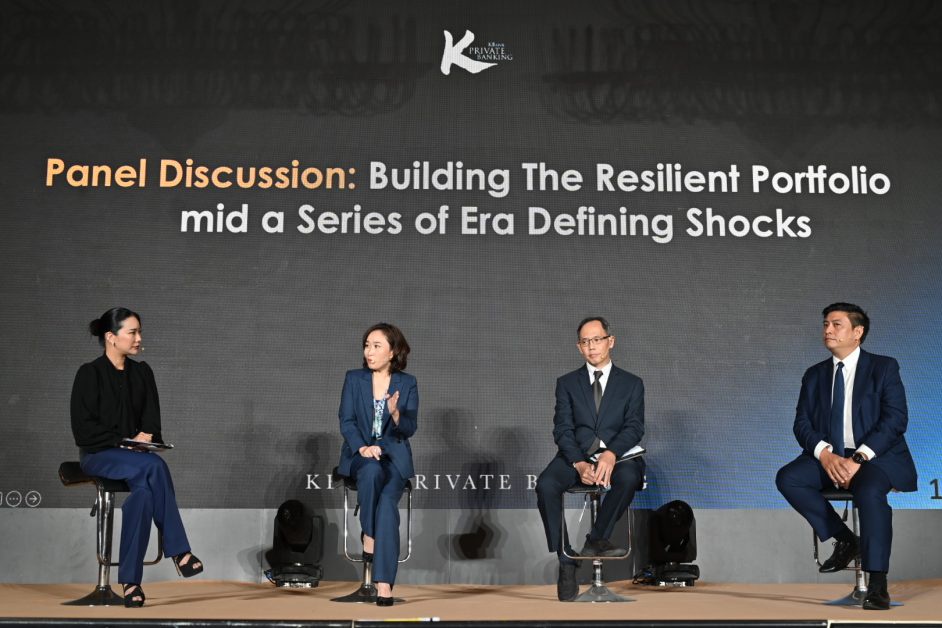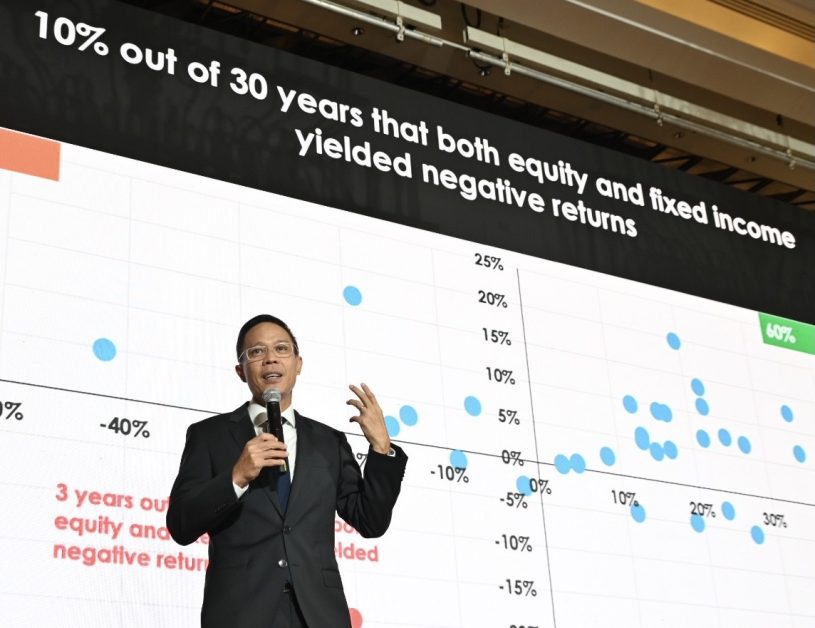KBank Private Banking KPB) and its strategic ally Lombard Odier, a world-class Swiss private bank, together with KResearch, forecast that the global economy will face a recession in 2023 due to the Federal Reserve's tightening monetary policy, China's zero-COVID policy and tentative reopening, as well as Europe's energy crisis. KResearch views that the Thai economy will inevitably bear the brunt of the global economic recession. Investors are thus recommended to invest in quality assets with high liquidity, focusing on diversification, especially via private assets, and focus more on sustainable investments.
Mr. Jirawat Supornpaibul, Executive Chairman, Private Banking Group of KASIKORNBANK, noted, "Throughout 2022, the investment market has been anxious about the US's runaway inflation, which prompted the Federal Reserve (Fed) to opt for aggressive interest rate hikes. Meanwhile, the protracted Russia-Ukraine war - which has no end in sight - has led to elevated energy prices in Europe, resulting in soaring inflation. Even though China's economy has yet to slide into a recession, its economic growth has still fallen short of the target despite the Chinese authorities' gradual reopening policy and implementation of fiscal policy to stimulate the economy. As a leading investment and wealth management advisory service provider, KPB has recommended that investors diversify their investment into private assets, including private equity, private debt and private real estate, so as to minimize their portfolio volatility. Investors are also advised to reduce their holding of equity funds while increasing their cash holding to around 5-15 percent of their portfolio to cushion against the impact of market volatility. They should adopt a wait-and-see attitude until the dust has settled."
Dr. Charl Kengchon, Executive Chairman of KASIKORN RESEARCH CENTER, offered an interesting viewpoint that the global economic recession will inevitably affect the Thai economy, particularly the export sector that will have to encounter falling growth over the next 12 months. Regarding GDP growth, it will mainly rely upon recovery of the tourism sector, which is expected to continue to sustain overall economic growth. However, challenges will persist in terms of high household debt and weak global economic growth through 2023. As a result, economic uncertainties will likely increase in 2024 and upcoming years.
Summary of three key viewpoints of Lombard Odier towards the global economy
Firstly - the Fed's interest rate hikes to curb inflation in the US. The Fed's important goal is to bring US inflation down to an acceptable level. With such interest rate increases, it is highly possible that the US economy will enter a recession. According to Lombard Odier's assessment, the Fed will raise the interest rate by 0.75 percent in November, 0.50 percent in December and eventually 0.25 percent next February, which will push the rate to its highest level of this cycle at 4.75 percent. Concerning inflation, Lombard Odier believes it will gradually go down to an acceptable level within the middle of next year. Given the problem of delays in supply chains, and improving situations of commodity prices and transport fees, inflation measured by goods prices will decrease. Additionally, the property market will face rising interest rates of home loans and higher home prices, which will lead to slowing demand for home purchases. There are two additional variables to be monitored, including: (1) Inflation measured by service prices remains at high levels; and (2) Unemployment has fallen somewhat, but is still high. Unemployment should be higher in order for inflation to drop further. However, this year's fundamentals, including the strengths of the banking, household and private sectors, are different from the 2008 crisis, which confirms Lombard Odier's opinion that a financial crisis can be avoided, although an economic recession will occur.
Secondly, following China's 20th National Congress of the Communist Party held recently, Lombard Odier believes China will continue to strive for economic growth after President Xi Jinping has further consolidated his power. Lombard Odier is of the view that China has two ways to promote its economic growth: (1) Opening up the country - It is likely that Beijing will gradually open up the country in 2023; and (2) Implementation of economic stimulus measures via fiscal policy. Aside from fiscal policy, Beijing still has an accommodative monetary policy in place. With benign inflation, China is the only country where interest rates are on a downward trend. This is aimed at sustaining the property sector by accelerating loan extension, which should be sufficient for China to avoid a hard landing and support economic growth over subsequent quarters.
Thirdly, the energy crisis in Europe. Inflation in Europe has soared amid skyrocketing energy prices. However, energy prices there have already begun to decline, with many factors affecting their volatility, including warmer-than-expected weather in Europe recently. As a result, the household sector has yet to use much energy for heating. Additionally, various European governments are making efforts to store energy reserves and diversify energy sources such as expanding nuclear and coal-fired power plants. Most importantly, they have increasingly switched to alternative energy. Having analyzed the overall European policies, Lombard Odier views that although Europe may not be able to avoid a recession, it may at least avoid the worst possible scenario.
Summary of 10 Investment Strategies by Lombard Odier
- Invest in quality assets, including highly liquid assets. This is imperative, especially during volatile market conditions, in order to bolster liquidity for the alignment of investment portfolios with the prevailing conditions.
- Focus on investment grade debentures rather than high-yield debentures, as the credit spread of debentures is set to increase.
- Focus on value and quality stocks.
- Manage your portfolio to earn returns during upward trends in the markets, while hedging against risks during downward trends.
- Minimize the proportion of gold investment in the portfolio. However, its investment prospects may change in the future.
- Sell off commodity assets, in alignment with Lombard Odier's outlook on an economic recession next year.
- Diversify risks by investing in alternative assets.
- The US Dollar will appreciate further, possibly reaching its highest level next year.
- Adjust with a dynamic portfolio amid market volatility that will remain high.
- Focus on sustainable investments.
Mr. Jirawat Supornpaibul, noted in closing, "KBank still recommends mixed funds for investment diversification across varied assets to reduce overall risk. K-ALLROAD Series funds, launched late last year, have received a good response from investors as the funds are suited to current market conditions. Plus, we advise customers to diversify their investments in other alternative assets, including our private equity funds that have generated returns of up to 47.83 percent* and 25.67 percent* since their establishment. Additionally, we introduced a sustainability-themed K-CLIMATE fund that has offered a return of +16.15 percent per annum** since the establishment of its master fund.
In 2023, KBank plans to continually introduce additional alternative investment products, such as private fixed income funds, private equity funds and private real estate funds, to diversify risks and generate satisfactory returns to customers' investment portfolios.
Interested persons can view a KBank Private Banking 2023 Economic and Investment Outlook seminar titled, "What's Next Heading into 2023", at the KBank Private Banking YouTube Channel: https://www.youtube.com/c/KBankPrivateBanking
Source: KASIKORNBANK

